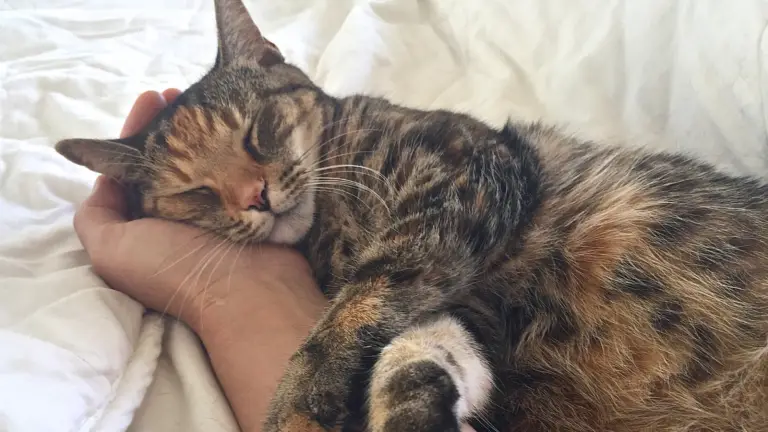SHOULD I BOARD MY CAT? [ 11+ THINGS TO CONSIDER]
Should I board my cat, get a cat sitter or bring my cat with me? Cats owners are always faced with the dilemma of what to do with their cats when they have to go away for vacation, work, or other reasons.
Whether you should board your cat or not depends on individual circumstances and needs, such as your cat’s temperament, length of time, health issues, available facilities, and financial situation.
If boarding is right for you, your cat must be evaluated carefully. To help you do that, we have listed all the most important factors to consider.
![SHOULD I BOARD MY CAT? [ 11+ THINGS TO CONSIDER]](https://dorkycats.com/wp-content/uploads/2023/02/Copy-of-Copy-of-Copy-of-4-FREE-PIN-TEMPLATES-2020-700x1500-12-1-512x1024.png)
SHOULD I BOARD MY CAT?
As a cat owner and based on my personal experience with my cats, I would always prefer keeping them at home and avoiding catteries, cat hotels, or moving them somewhere else if possible.
But cats are different, and the circumstances are different.
If you have a trusted friend or family member who can care for your cat while you’re away, that may be a better option than boarding. If you choose to board your cat, be sure to research and choose a facility that is a good fit for your cat’s needs.
Whether or not you should board your cat depends on your specific circumstances and your cat’s individual needs. Here are some things to consider when deciding whether to board your cat:
1. LENGTH OF TIME
If you’ll be away from home for an extended period and you don’t have anyone to care for your cat, boarding may be a good option.
2. YOUR CAT PERSONALITY
If your cat is easily stressed or anxious, boarding may not be the best option. Some cats may become overwhelmed by the unfamiliar environment and the presence of other animals, which can lead to behavior problems.
If you have a shy or scared cat, a cattery can be too overwhelming, and any other arrangement outside the house.
3. HEALTH ISSUES
If your cat has health issues requiring regular medication or monitoring, boarding may not be a good option. In this case, hiring a pet sitter who can provide individualized care for your cat may be better.
4. BOARDING FACILITIES
If you decide to board your cat, choose a reputable boarding facility that provides clean and safe accommodations and has trained staff who can provide individual attention and care to your cat.
5. VACCINATIONS
Many boarding facilities require that your cat be up-to-date on their vaccinations before being admitted. Ensure you have all the necessary documentation before booking your cat’s stay.
6. SPECIAL NEEDS
If your cat has any special needs or requires specific accommodations, communicate these needs with the boarding facility to ensure they can be met.
7. DIET
If your cat has specific dietary requirements or food preferences, ensure the boarding facility can accommodate these needs.
8. EXCERCISE AND PLAYTIME
Find out how often your cat will be let out of their enclosure for exercise and playtime and what kinds of activities they will have access to.
9. STAFF QUALIFICATIONS
Ensure the boarding facility has experienced, and knowledgeable staff trained to handle cats and provide the necessary care.
10. NOICE LEVEL
If your cat is sensitive to noise, ensure the boarding facility is in a quiet location, and the environment is relatively calm.
11. COSTS
Boarding your cat can be expensive, so consider the cost in your decision-making process. Some facilities may offer discounts for longer stays or multiple pets, so it’s worth shopping for the best deal.
WHAT ARE THE PROS AND CONS OF BOARDING A CAT?
It is essential to consider the pros and cons of boarding a cat before making a final decision and consider all the aspects involved for you and your cat.
Here are some potential pros and cons of boarding a cat:
PROS
- Professional care: A reputable cattery can provide professional care and attention for your cat, with trained staff experienced in handling and caring for cats.
- Regular feeding and exercise: A cattery will ensure that your cat is fed and exercised regularly, helping to maintain their physical health and well-being.
- Safe environment: A cattery provides a safe and secure environment for your cat, protecting them from potential hazards such as traffic or predators.
- Social interaction: Your cat may enjoy socializing with other cats at the cattery, which can help prevent boredom and provide mental stimulation.
- Specialized facilities: Some catteries offer specialized facilities and services, such as play areas, grooming, or medical care, which can benefit certain cats.
- Peace of mind: Boarding your cat can provide peace of mind, knowing that your cat is being well-cared for while you are away.
- Convenient: Boarding your cat can be a convenient option if you are traveling and cannot arrange a cat sitter or another alternative.
- Less disruption at home: Boarding your cat can prevent disruption from a cat sitter coming and going.
- Opportunity for observation: A cattery allows staff to monitor your cat’s behavior and health, allowing potential problems to be addressed early on.
CONS
- Stress: Boarding can be a stressful experience for some cats, particularly those who are anxious or have difficulty adjusting to new environments.
- Illness: Your cat may be at a higher risk of contracting illnesses in a communal environment, such as a cattery, particularly if they have not been properly vaccinated.
- Lack of personal attention: Some cats may not receive the attention and affection they are used to when boarding.
- Changes in routine: Your cat’s routine may be disrupted when they are boarded, leading to anxiety or behavioral problems.
- Cost: Boarding your cat can be expensive, particularly if you opt for a high-end facility or require specialized services.
- Limited space: Some catteries may have limited space or be fully booked during peak times, making it difficult to find a suitable facility.
- Travel stress: Transporting your cat to and from the cattery can be stressful for you and your cat, particularly if they are not accustomed to traveling.
- Risk of escape: There is a small risk that your cat could escape from the cattery, particularly if they are highly motivated to escape or the facility is not adequately secure.
- Lack of control: Boarding your cat means you relinquish control over their care to the cattery staff, which may be uncomfortable for some cat owners.
WILL MY CAT HATE ME IF I BOARD HIM?
It’s unlikely that your cat will hate you if you board him. Cats don’t hold grudges as humans do, and they won’t understand that you’re responsible for the decision to board them.
However, your cat may experience some stress and anxiety from being separated from you and placed in a new environment, such as a boarding facility. It’s important to provide your cat with plenty of love and attention when you return home to help them feel reassured and comfortable.
IS CAT BOARDING CRUEL?
No, cat boarding isn’t inherently cruel.
A reputable cat boarding facility will provide your cat with a safe, comfortable environment, with plenty of food, water, and opportunities for exercise and play.
However, some cats may experience stress and anxiety from being in a new environment, and it’s important to choose a boarding facility that is experienced in caring for cats and can provide appropriate accommodations and care.
Suppose you’re concerned about the well-being of your cat while you’re away. In that case, you may consider other options, such as having a trusted friend or family member care for your cat in your home or hiring a professional pet sitter to visit your home and care for your cat while you’re away.
This can provide your cat with the familiarity and comfort of its home environment, which may be less stressful than being in a new place.
SHOULD I BOARD MY CAT OR LEAVE HIM AT HOME?
Whether you should board your cat or leave them at home depends on your specific circumstances and your cat’s individual needs.
If you’re going to be away for an extended period, boarding may be a better option since your cat will receive more care and attention than they would if they were left alone.
If your cat is easily stressed or anxious, leaving them home may be a better option. Cats are typically more comfortable in their own environment and may become overwhelmed in a new environment.
If your cat has any health issues requiring regular medication or monitoring, it may be better to leave them at home and hire a pet sitter to provide individualized care for your cat.
A pet sitter can provide daily care and attention for your cat and ensure that they have fresh food and water, a clean litter box, and a safe environment.
Cost: Boarding your cat can be expensive, so consider the cost in your decision-making process. Hiring a pet sitter may be a more cost-effective option.
Ultimately, the decision to board your cat or leave them at home depends on what is best for your cat’s individual needs, as well as your circumstances and budget. Carefully weigh your options and choose the best solution for your furry friend.
WHERE CAN I LEAVE MY CAT WHILE ON VACATION?
There are a few options for where you can leave your cat while you are on vacation. Here are some possibilities:
BOARDING FACILITIES
You can consider boarding your cat at a reputable boarding facility. Research and visit the facility beforehand to ensure that they provide a safe and comfortable environment for your cat.
PET SITTER
You can also hire a pet sitter to come to your home and take care of your cat while you’re away. You can find pet sitters through online platforms such as Rover or Care.com or through referrals from friends or your veterinarian.
FRIENDS OR FAMILY
You can ask a trusted friend or family member to care for your cat while you’re away. This can be a good option if your cat is comfortable with the person and if they have experience caring for cats.
CATS HOTELS
Some cities have cat hotels or cat-only boarding facilities that may provide more personalized care for your cat. A cat hotel is a cat boarding facility that provides a temporary home for cats while their owners are away.
Cat hotels are typically designed to be a comfortable and secure environment, with private or semi-private accommodations, toys, scratching posts, and other amenities that keep cats engaged and entertained.
Some cat hotels may also offer grooming services, playtime, and socialization opportunities depending on the facility.
The staff at a cat hotel is usually trained in cat care and will provide food, water, and litter box maintenance for each cat. Some cat hotels may also offer medical care and monitoring and can administer medications or special diets as needed.
WHAT ARE THE PROS AND CONS OF BRINGING MY CAT ON VACATION WITH ME?
Bringing your cat on vacation with you can be a wonderful experience for you and your feline friend, but it also has its challenges. Similar to a boarding experience, some cats can find the travel and the change of environment to be stressful.
Here are some pros and cons to consider:
Pros:
- Bonding time: Bringing your cat with you can create an opportunity for you to bond with your cat in a new and exciting environment.
- Peace of mind: You may feel more at ease knowing that your cat is safe with you rather than worrying about how they are doing while you are away.
- No need to find a caregiver: If you bring your cat with you, you won’t have to go through the process of finding a trusted caregiver for your cat, which can be stressful.
- Fun experiences: If your cat is comfortable traveling, you can have fun experiences together on your vacation that you wouldn’t be able to have otherwise.
Cons:
- Travel stress: Many cats find traveling stressful, and the experience of being in a new environment may cause anxiety and discomfort.
- Health risks: Traveling can expose your cat to new environments, people, and animals, increasing the risk of exposure to diseases or parasites.
- Accommodation challenges: Finding pet-friendly accommodations can be challenging and may limit your choices for where to stay on your trip.
- Disturbance of routine: Cats thrive on routine, and disrupting their usual schedule and environment can cause stress and discomfort.
DO CATS GET TRAUMATIZED IN A CATTERY?
Cats can become stressed and anxious in a cattery or boarding facility, leading to behavioral changes and potential health issues.
Whether or not a cat becomes traumatized in a cattery depends on several factors, such as the cat’s temperament, the quality of care provided at the facility, and the cat’s previous experiences with boarding.
Some cats may feel more comfortable in their familiar environment and experience more stress and anxiety when placed in a new, unfamiliar environment.
In addition, some cats may have negative experiences at boarding facilities, such as lack of attention, insufficient food or water, or exposure to other cats that are aggressive or sick.
To help reduce the potential for trauma or stress, choosing a reputable cattery with experienced staff and a clean and comfortable environment is important.
You can also take steps to prepare your cat for its stay, such as bringing familiar bedding or toys and ensuring they are up-to-date on vaccinations and health checkups.
IS A CAT SITTER BETTER THAN A CATTERY?
It’s important to remember that cats are sensitive animals and can pick up on their owner’s emotions. If you are anxious or stressed about leaving your cat in a cattery, this can also impact your cat’s behavior and well-being.
A cat sitter can be a good option if your cat is more comfortable in their familiar home environment and has a low-stress tolerance for new situations. A cat sitter can provide daily visits to your home to feed your cat, provide fresh water, clean the litter box, and spend time playing with and providing affection for your cat.
This can help your cat feel less anxious and more relaxed, as they are not exposed to new surroundings or unfamiliar animals.
On the other hand, a cattery can be a good option if your cat is social and enjoys interacting with other cats or if you are going to be away for an extended period and a cat sitter may not be available to visit your cat every day.
A reputable cattery will provide your cat with a clean, comfortable, and safe environment, social interaction with other cats, and trained staff to monitor your cat’s health and well-being.
HOW MUCH DOES IT COST TO PUT A CAT IN A CATTERY?
The cost of boarding a cat in a cattery can vary depending on several factors, such as location, amenities, and length of stay. In general, the daily rate for cat boarding can range from $15 to $50 or more per day.
Some catteries may offer additional services such as playtime, grooming, or veterinary care, which can increase the overall cost. It’s important to research different catteries in your area and read reviews from other cat owners to ensure you choose a reputable and high-quality facility for your cat.
Remember that some catteries may offer discounts for longer stays or multiple cats, so it’s always a good idea to ask about any promotions or specials when booking your cat’s stay. Additionally, some catteries may require a deposit or payment in advance to reserve a spot for your cat.
HOW CAN I REDUCE MY CAT’S STRESS IF I DECIDE TO BOARD HIM?
If you decide to board your cat, there are several things you can do to help reduce their stress and make the experience as comfortable as possible for them:
- Choose a reputable cattery: Look for a cattery that has a good reputation, is clean, well-ventilated, and has a friendly and knowledgeable staff. You can also ask for recommendations from other cat owners or your veterinarian.
- Visit the cattery beforehand: Take your cat for a visit to the cattery before their stay so they can get familiar with the environment, the staff, and the other cats. This can help to reduce their anxiety during their actual stay.
- Bring familiar items: Bring your cat’s favorite toys, blankets, and bedding to the cattery to help them feel more comfortable and secure.
- Provide a calming aid: Consider providing a calming aid such as Feliway, a synthetic pheromone that can help reduce cat stress and anxiety.
- Communicate with the staff: Communicate any special needs or preferences your cat may have with the cattery staff, such as dietary requirements, medication, or playtime preferences.
By taking these steps, you can help to reduce your cat’s stress and make their boarding experience as comfortable as possible.
FREQUENTLY ASKED QUESTIONS
Do cats feel abandoned when you go on vacation?
Cats can certainly miss their owners when they are away on vacation, but whether or not they feel abandoned can depend on several factors, including the cat’s personality, temperament, and past experiences.
Some cats are more independent and may not show much distress when their owners are away, while others may become more anxious or clingy.
Cats who have been abandoned or had negative experiences with separation may be more likely to experience anxiety or stress when their owners are away.
Is it OK to put a cat in a cattery?
Putting a cat in a cattery is generally okay if the facility is reputable and provides proper cat care.
A good cattery should have a clean and safe environment, comfortable living spaces for the cats, and proper hygiene practices to prevent the spread of diseases.
Additionally, they should provide adequate food, water, and exercise for the cats and attention and affection from the staff.
Will my cat be OK with a sitter?
Most cats can do well with a cat sitter if the sitter is reliable and attentive to the cat’s needs. Cats are territorial animals and can become stressed or anxious if taken from their familiar environment.
Having a cat sitter come to your home lets your cat stay in its comfortable surroundings and access its usual food, water, litter box, and toys.
How long cats are allowed to stay in a cattery?
The length of stay for cats in a cattery can vary depending on the specific facility and its policies. Some catteries may allow cats to stay for just a few days, while others may allow longer stays of a week or more.
Some may also offer discounts for longer stays. It’s best to check with the cattery you’re interested in to see their policies regarding length of stay.

![SHOULD I BOARD MY CAT? [ 11+ THINGS TO CONSIDER]](https://dorkycats.com/wp-content/uploads/2023/02/Blogging-Tips-LinkedIn-Post-Header-2023-02-22T003549.966.png)





